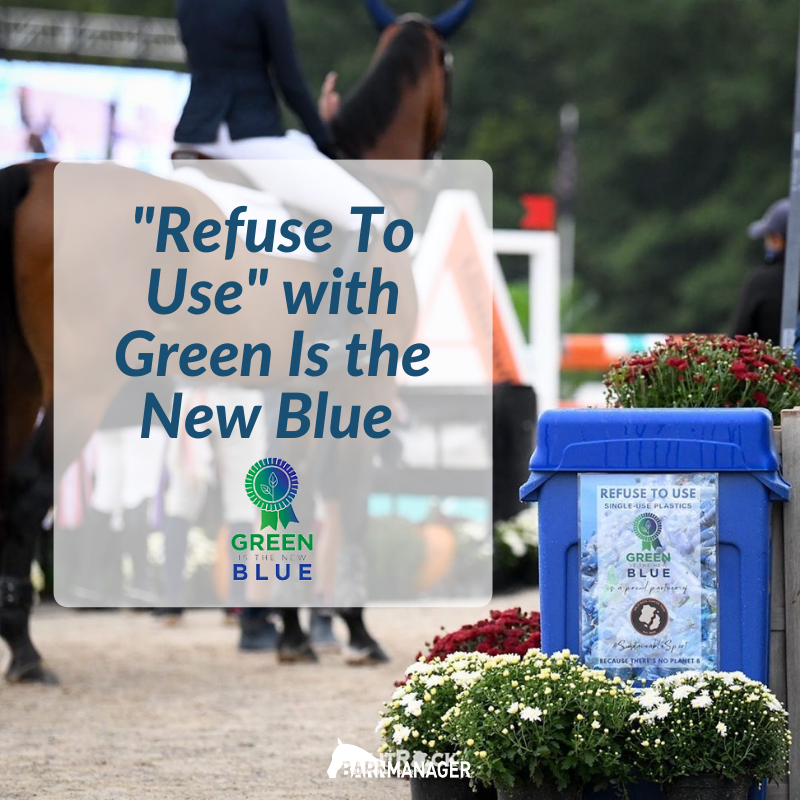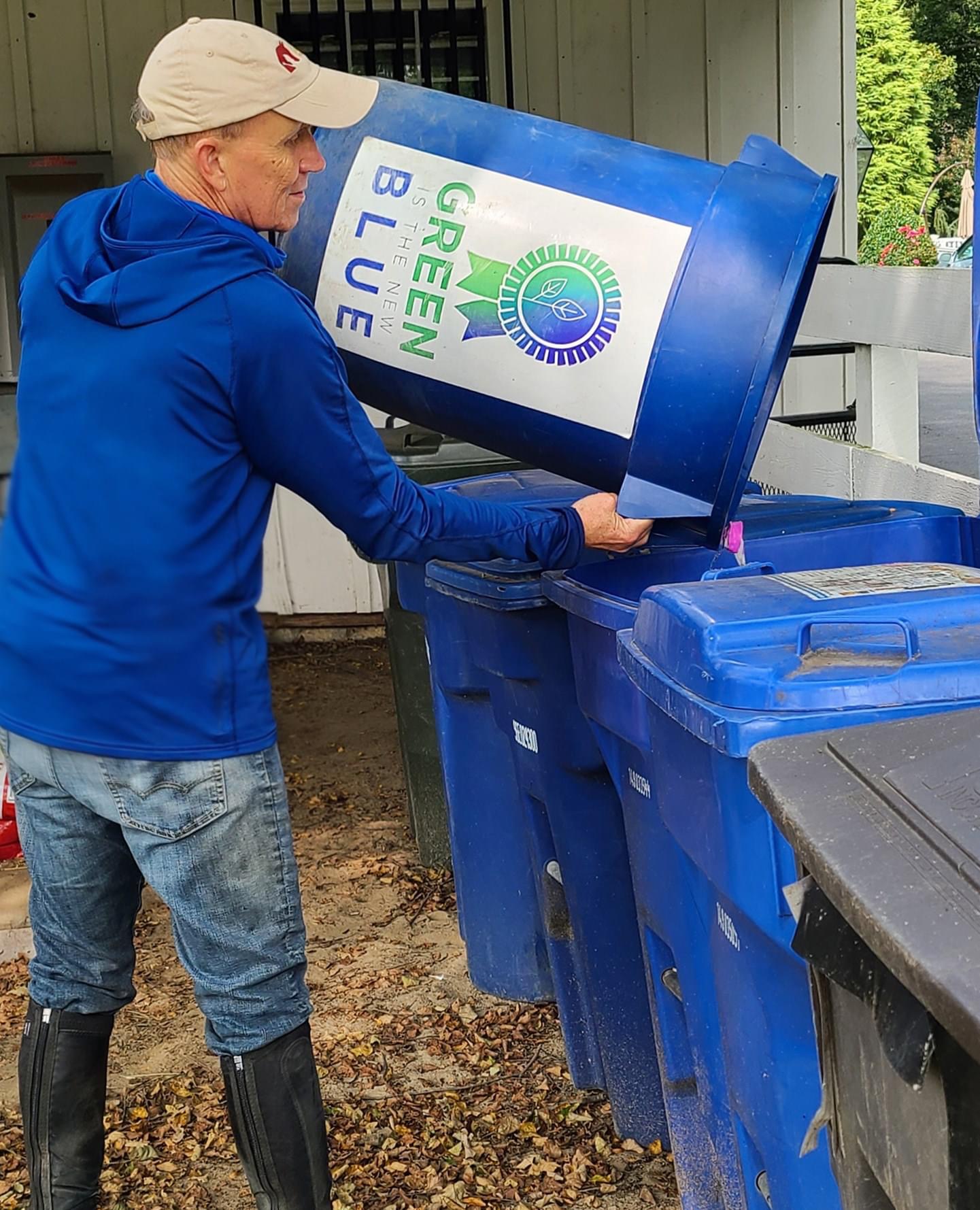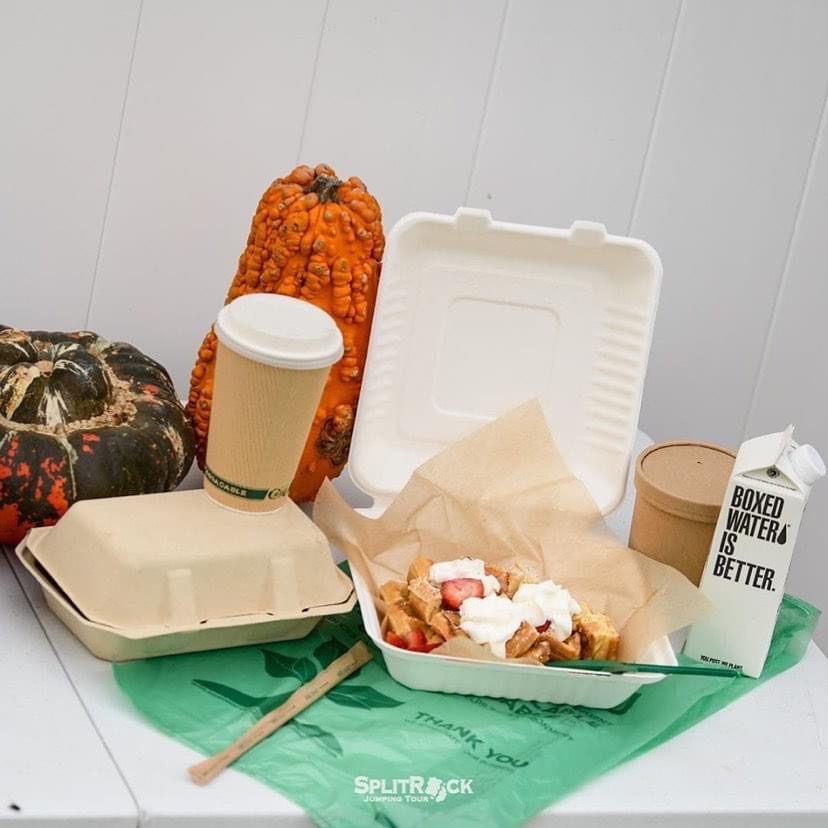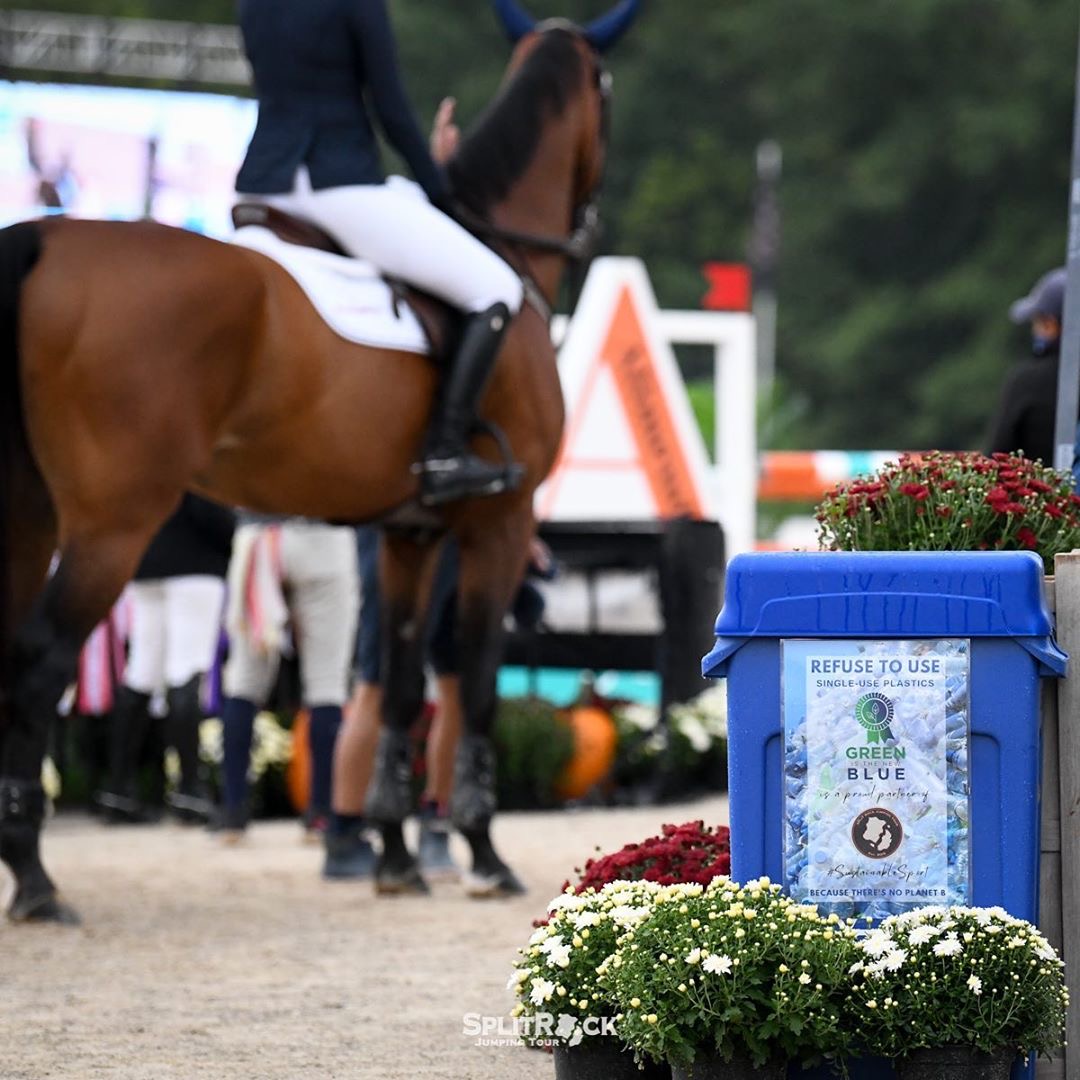
“Refuse To Use” with Green Is the New Blue
Written by Anna Zygadlo for Green Is the New Blue
Green Is the New Blue is a non-profit dedicated to reducing the environmental impact of horse shows, educating equestrians, and supporting the movement for a sustainable sport. Our “Refuse to Use” campaign highlights the necessity of refusing to use single-use plastics, sourcing alternative products, and reusing material whenever possible.

Bill Rube of Gleneayre Equestrian Program n Lumerton, NJ, practices recycling with GITNB. Photo courtesy of GITNB
“It’s so important to not just recycle but to reduce the need for recycling,” explained R. Scot Evans, the creative director for Green is the New Blue. “The chilling facts are real: there are eight trillion pieces of single-use plastic currently circulating in the oceans around the world. It’s no longer about just picking up a piece of plastic and recycling it, it’s about refusing to use it.” The harsh reality is that many plastic bottles never actually get recycled, even if placed into recycling bins.
What We’re Doing
In order to combat single-use plastics on the showgrounds, Green Is the New Blue implemented touch-free water refill stations, allowing riders to bring their own reusable water bottles and safely fill them with clean water. In a modified effort to combat Covid-19, our partners have provided Boxed Water Is Better™ at select horse shows around the country. We know that plastic and other recyclable materials may still find a way onto the showgrounds, so recycling bins are strategically placed next to all trash cans at our partner events.
At Green Is the New Blue, we also work with vendors at our partner horse shows to minimize waste and switch to more environmentally friendly product packaging. There are many affordable alternatives to single-use plastics that can be incorporated into equestrian and restaurant business practices. At the Aiken Horse Park, we collaborated with Angela and Kory Merrill of Perks With a Twist, now one of the horse show world’s leaders in sustainable food service. Every serving product (think to-go boxes, plasticware, and napkins) used in the café is now compostable, using materials such as sugar cane, eliminating the waste the business sends out into the world after use.

Compostable food packaging at the Aiken Horse Park by Perks With A Twist. Photo by Split Rock Jumping Tour
As individuals, what can we do to reduce plastic use on a day-to-day basis? At Green Is the New Blue, we have a list of some of the ways you can reduce plastic in your daily life as an equestrian.
-
Implement a recycling program.
No matter how hard you try, plastics are going to make it onto the property. Maximize participation with easy access to recycling bins and very clear labeling. Ensure items placed in bins are clean and do not contaminate other materials.
-
Repair items before replacing.
Repair wheelbarrows, reinforce broken pitchforks with twine, and replace a single zipper rather than the whole pair of boots. Over time, many items will break with use. Repair what you can and keep items in circulation as long as possible. When purchasing tools, choose products with easily replaceable parts so you can repair the broken piece rather than replace the whole item. Avoid planned obsolescence, or consumer goods intended to be replaced and disposed of quickly.
-
Repurpose items when possible.
Skip the trash bag and line your bins with a grain or shavings bag that may otherwise be sent straight to a landfill. Grain bags are recyclable, although very few recycling facilities currently accept this type of plastic. Supplement buckets can be repurposed for bathing and storage.
-
If there is an alternative to plastic, choose it.
Purchase aluminum instead of plastic when possible, such as sweat scrapers, curry combs, tail combs, and grain scoops. Source hay baled with steel wire as opposed to plastic twine.
-
Upcycle Jumps and Avoid PVC.
PVC contains harmful chemicals, making it difficult and dangerous to recycle. Avoid using it for fencing and jumps. Instead, create your jump course using upcycled materials, such as pallets, rowboats, and doors. For more course design inspiration, check out our new monthly column “JumpCycled: Setting Greener Standards.”
-
Purchase fly spray and other items in bulk.
If you need to purchase solutions bottled in single-use plastics, choose higher concentrations in large containers. Save plastic by diluting the concentrate and refilling the same spray bottle.
-
Purchase and store shavings in bulk.
If you have the storage space, skip the individually bagged shavings and choose bulk shavings, which is generally more cost effective. If you must use bags, try to choose paper rather than plastic. Paper shavings bags can be repurposed as poultice paper. Many plastic shavings bags are recyclable, so check if your local facility will accept that plastic type and deposit in bulk. Make sure to shake out the bags well, as they will not be accepted if they are contaminated with shavings.
-
Install a water refill station at the barn.
Encourage riders to bring their own reusable water bottles and refill them at the barn. If you do supply single-use cups, choose compostable materials and small sizes.
-
Reusable containers and bags are your friend.
Pack your lunch in a reusable container to reduce plastic use. Take-out often involves single-use plastics and foam containers. If you do get takeout, save the takeout container for meal prep. There is no need to purchase your own containers when you can repurpose things like capped yogurt cups and sauce jars. And of course, don’t forget your reusable bag when grocery shopping or heading to the tack shop.
-
Equestrians love coffee and need the caffeine.
Add a coffee maker to your tack room and encourage others to refill a cup, rather than leave the barn and purchase coffee in single-use cups. Also, choose your coffee brand strategically. Choose shade-grown options and opt for a reusable filter or French press to minimize the environmental impact of your coffee habit.
Don’t forget to reduce and reuse first to lessen the need for recycling. To learn more about our “Refuse to Use” campaign and read more educational articles, visit our website and social media.
 Recycling bins at the ingate of Split Rock Jumping Tour.
Recycling bins at the ingate of Split Rock Jumping Tour.
Photo by Split Rock Jumping Tour